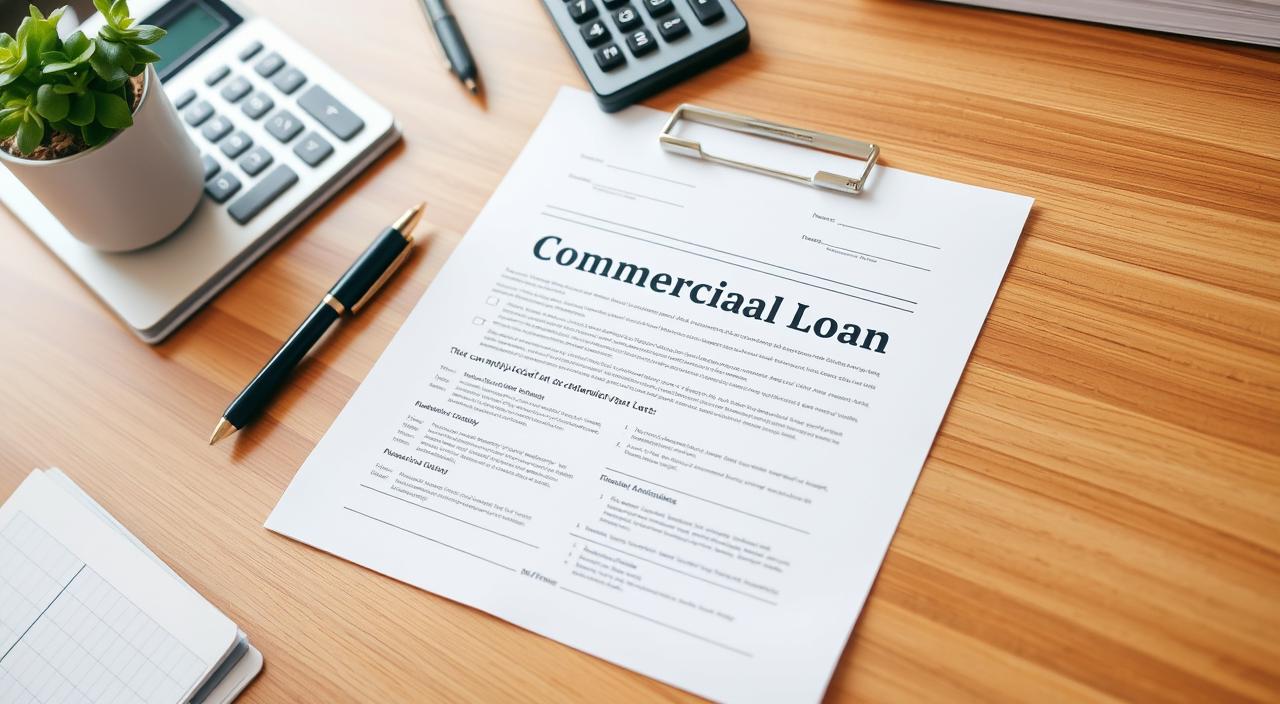Ever wondered why some businesses get funding easily while others struggle? It might be because of the commercial loan application process. This process is key for any entrepreneur wanting to grow their business. We’ll show you how to apply for a commercial loan and why each step is important for approval.
Key Takeaways
- Understand the significance of a well-prepared commercial loan application.
- Identify different types of business loans available for various needs.
- Recognize the key components that lenders look for in your application.
- Gather necessary documentation to streamline the application process.
- Learn how to improve your credit profile before applying for commercial funding.
- Be aware of the common challenges faced in the commercial loan approval process.
Understanding Commercial Loans
Commercial loans are key for businesses looking to grow or support their operations. They help fund purchases, inventory, or expansions. Knowing about commercial loans helps businesses choose the right financing for their needs.
What is a Commercial Loan?
A commercial loan is made for businesses, not personal use. It offers structured repayment, competitive rates, and specific terms. These loans are vital for cash flow and growth, making them a key part of financial planning.
Types of Commercial Loans
It’s important for business owners to know the different commercial loans. Here are some main types:
- Term Loans: These loans have a fixed repayment plan, great for buying real estate or big assets.
- Lines of Credit: These offer flexibility, letting businesses borrow up to a set limit as needed.
- SBA Loans: Backed by the Small Business Administration, these loans have good terms for eligible entrepreneurs.
- Equipment Financing: This is for buying machinery and equipment, secured by the equipment itself.
Each type of commercial loan offers unique financing options for different business needs and goals.
Benefits of Commercial Loans
Understanding commercial loans is key for businesses wanting to grow and stay financially stable. The right loan gives companies access to the funds they need for big investments, expansions, or improvements. This section explores the main benefits of commercial loans, including getting more capital and tax savings.
Access to Larger Funds
Commercial loans offer a big advantage: they let businesses get more money than personal loans. These loans are made for business needs, like buying new equipment, growing facilities, or funding research. Getting a lot of money can help a company grow and stay competitive.
Tax Deductions
Commercial loans also come with tax benefits. Businesses can deduct interest payments from their income, lowering taxes. This makes it easier to manage finances in the short term and encourages more investment. Knowing about these tax benefits can help businesses use loans wisely.
Commercial Loan Application Overview
Applying for a commercial loan needs careful attention. Knowing the key parts of the application is key. Each part shows the borrower’s creditworthiness. Giving correct info is critical, as wrong data can cause delays or rejection.
Key Components of the Application
The commercial loan application has several important parts. Lenders look at:
- Financial statements, like balance sheets and income statements
- A business plan showing how the company will grow
- Personal financial info of the business owners
- Credit history and score
- Cash flow projections to show future earnings
Importance of Accurate Information
It’s vital to give accurate info for a smooth process. Lenders use this info to check risk and decide if you can get a loan. Mistakes or wrong data can slow down or block your loan. Giving clear, precise details helps get the loan you need.
By making sure all info is right and complete, you can move through the application smoothly. This leads to better chances of getting the loan you want.
Preparing for Your Commercial Loan Application
To successfully apply for a commercial loan, you need to prepare well. Start by gathering all necessary documents and understanding your credit history. These steps will help you get a good loan outcome.
Gather Required Documentation
Having the right documents ready can speed up your loan application. Here’s a list of what you’ll likely need:
| Document Type | Description |
| Tax Returns | Typically the last three years of federal tax returns for both the business and personal. |
| Business Operating Agreement | A legal document that outlines the operations and ownership of the business. |
| Financial Statements | Current balance sheets and income statements to provide a snapshot of financial health. |
| Cash Flow Projections | Estimates of future cash flows to demonstrate business viability. |
| Credit History | Reports detailing both personal and business credit histories which lenders will review. |
Understand Your Credit History
Your credit history is key when applying for a loan. Lenders will check it closely, looking at your credit score and debts. A better credit score can mean lower interest rates.
Looking over your credit history before applying helps. It lets you fix any problems that might stop your loan from being approved.

Commercial Lending Requirements
For businesses looking for financial help, knowing the lending requirements is key. Lenders check many things to see if you qualify for a loan. They look at financial ratios and what you can offer as collateral, which affects the loan terms.
Eligibility Criteria for Businesses
Businesses need to meet certain criteria to get a loan. Lenders want to see companies that are well-established and have a good track record. They look for:
- At least two years in business.
- A stable cash flow to pay back the loan.
- A legal structure like an LLC or corporation, which shows credibility.
These criteria are important for lenders to decide if they will approve your loan.
Common Financial Ratios
Financial ratios help lenders understand a business’s financial health. Important ratios include:
| Financial Ratio | Description |
| Debt-to-Income Ratio | Shows how much income goes to debt payments. |
| Current Ratio | Looks at liquidity by comparing current assets to liabilities. |
| Return on Assets (ROA) | Measures how well a company uses assets to make profit. |
These ratios help lenders see the risk and how much they can lend to a business.
Understanding Collateral Requirements
Collateral is very important when getting a loan. It helps protect lenders and makes them feel safer. Common collateral includes:
- Real estate properties.
- Equipment and machinery.
- Inventory and accounts receivable.
Knowing about collateral and how it affects loan terms can help businesses make better financial choices.
Small Business Loan Process Explained
Understanding the small business loan process is key for entrepreneurs. It involves several important steps to secure loans. Each step is vital for your application’s success and funding. Knowing common pitfalls can make the process smoother.
Steps to Secure a Small Business Loan
- Assess Your Business Needs: Figure out how much money you need and for what.
- Research Lenders: Look into different lenders like banks, credit unions, and alternative lenders.
- Prepare Documentation: Gather all financial documents, tax returns, and business plans needed.
- Submit Application: Fill out the loan application with correct information to avoid delays.
- Review Terms: Carefully review the loan terms before signing the agreement.
- Receive Funds: After signing, funds will be given out according to the lender’s procedures.
Common Pitfalls to Avoid
- Insufficient Financial Documentation: Incomplete or poorly prepared documents can cause delays or denials.
- Neglecting Credit History: A low credit score can make it hard to get good loan terms.
- Lack of Business Plan: Without a clear plan, lenders may struggle to understand your business.
- Overlooking Eligibility Requirements: Not meeting lender criteria can waste time and effort.
- Rushing the Application: Taking time to prepare can improve your chances of approval.

Business Loan Application Steps
Getting a business loan involves careful planning and knowing what to do. This guide will help you through each step for a successful application. Understanding the process helps you avoid mistakes and get all the information you need.
Step-by-Step Guide to Apply
- Assess Your Needs: First, figure out how much money you need and why. Knowing this helps you choose the right loan.
- Research Lenders: Different lenders offer different terms and rates. Look at interest rates, fees, and repayment plans to find the best loan for you.
- Gather Necessary Documentation: You’ll need financial statements, tax returns, and personal info. Having these ready makes the process smoother.
- Complete the Application Forms: Fill out the application carefully. Accurate info shows you’re a reliable borrower.
- Review Your Application: Before you send it, check for mistakes or missing info. Double-check everything.
- Submit for Review: After checking, send your application. Remember to follow up to make sure it’s received.
Creating a Strong Business Plan
Making a solid business plan is key for any business looking for funding. Business plans are vital as they guide the company’s path and share important details with lenders. A good plan is the first step to a successful loan application.
Why a Business Plan Matters
A strong business plan shows lenders you know your market, finances, and how you’ll run your business. This reduces risk for lenders, making them more likely to say yes. Investors need to see that business plans are important, so entrepreneurs must put effort into this document.
Essential Elements of a Business Plan
To make a strong business plan, focus on these key parts:
- Market Analysis: Know your target audience and competitors.
- Organizational Structure: Show who does what in your business.
- Financial Projections: Give clear views on income and costs.
- Marketing Strategy: Explain how you’ll get and keep customers.
- Funding Request: Say how much money you need and why.

Commercial Loan Application Checklist
Getting ready for a commercial loan application can feel overwhelming. Knowing what documents you need is key. A good checklist helps you gather and present all necessary documents smoothly. We’ll cover the main documents and give tips for a complete application.
Documents You Need
Here’s a detailed list of important documents for a commercial loan application. Having these ready can speed up the approval process.
| Document Type | Description |
| Business Plan | A detailed plan that outlines the business model, target market, and financial projections. |
| Financial Statements | Include balance sheets, profit and loss statements, and cash flow statements for the last three years. |
| Tax Returns | Personal and business tax returns for the previous two years. |
| Bank Statements | Business bank statements for the last six months to demonstrate cash flow. |
| Ownership Documents | Documentation proving ownership of businesses and relevant assets. |
| Legal Documents | Operating agreements, bylaws, or articles of incorporation depending on your business structure. |
Tips for a Complete Application
Submitting a complete application can greatly reduce wait times. Here are some tips to make sure your application is ready:
- Check your commercial loan application checklist thoroughly to ensure no documents are missing.
- Double-check all financial statements for accuracy and completeness before submission.
- Seek assistance from a financial advisor if you are unsure about any of the required documents.
- Verify that all personal and business information is up to date and consistent across documents.
Applying for a Business Loan: Tips and Strategies
Getting a business loan needs careful planning and knowing what to do. Start by researching lenders to learn what they expect. Each lender has its own rules, so it’s key to know them well.
Research Lenders Thoroughly
Before you apply for a business loan, do your homework on lenders. Look at banks, credit unions, and online lenders. They serve different businesses with different loans. Knowing what they offer helps you find the right one for you.
Think about things like interest rates, how long you’ll pay back the loan, and how you’ll make payments. Also, check out what other customers say. Their feedback can tell you a lot about the lender’s service.
What Lenders Look For
Lenders focus on a few key things. They want to see if your business is financially stable. They’ll look at your credit history, financial reports, and how much money you make. This helps them decide if they should lend to you.
- Credit Score: A good credit score can get you better loan terms.
- Business Viability: Show that your business has a strong plan and can grow.
- Collateral: Lenders often want something of value as security for the loan.
- Experience: Having experience in your field can make you more credible.
Knowing what lenders look for helps you prepare your application. This way, you can show them you’re a good candidate for a business loan.

Commercial Mortgage Application Basics
The commercial mortgage application process is different from other loans. It has its own challenges and chances. Knowing about loan differences and interest rates is key to getting financing. This knowledge helps applicants prepare better and deal with commercial financing’s complexities.
Key Differences from Other Loans
Commercial mortgages are not like residential ones. The loan’s purpose shapes its structure and repayment terms. In commercial loans, lenders focus more on the property’s cash flow and profit than the borrower’s credit score. Also, commercial loans usually need bigger down payments and have shorter repayment times.
Understanding Interest Rates
Interest rates for commercial mortgages change a lot. This is because of many factors like the property type, the borrower’s finances, and market conditions. Lenders see commercial loans as riskier than residential ones. So, commercial interest rates can be affected by:
- Property Type: Different commercial properties have different risk levels, leading to varying rates.
- Down Payment Amount: A bigger down payment can mean lower interest rates, as it lowers the lender’s risk.
- Loan Duration: Shorter loans might have lower rates, but longer ones can cost more over time.
| Factor | Impact on Interest Rates |
| Property Type | Varies based on the stability and income of the property |
| Down Payment | A higher down payment generally leads to better rates |
| Loan Duration | Shorter terms often have lower rates, affecting overall cost |
Commercial Loan Approval Process
The commercial loan approval process has several key steps. Each step is designed to make sure both the lender and borrower know what the loan is about. The time it takes to get approved can change a lot. This depends on the documents given and how complex the loan is.
A big part of this process is the underwriting phase. Here, detailed checks are done.
How Long Does Approval Take?
The time it takes to get approved can vary. It depends on the lender and the loan details. Usually, it can take a few days to a few weeks.
Things that can affect this time include:
- How complete the application is
- How fast the documents are sent in
- How complex the business finances are
- How busy the underwriter is
Understanding the Underwriting Process
The underwriting process is very important. Underwriters look at many parts of the application. They check to see if the loan is safe and if the business can pay it back.
They look at things like:
- The credit history of the business and its owners
- How much money the business will make
- The business’s debts and what it owes
- The value of any property used as collateral
This careful look helps lenders make smart choices. It makes sure both sides agree on the loan terms before it’s finalized.
Building a Strong Financial Profile
Having a strong financial profile is key to getting loans approved. It boosts your chances of getting approved and can lead to better loan terms. To achieve this, focus on improving your credit score and managing your debts well.
Improving Your Credit Score
Boosting your credit score is vital for good loan conditions. Here are some steps to help:
- Pay bills on time, including loans and credit cards.
- Keep credit card balances low compared to your limits.
- Check your credit reports often and fix any mistakes quickly.
A higher credit score shows you’re financially reliable. This makes lenders more likely to give you credit.
Managing Existing Debts
Managing your debts well is also important for a strong financial profile. Here are some tips:
- Combine debts to make payments easier and possibly lower interest rates.
- Pay off debts with high interest rates first to save money.
- Make a budget that includes money for debt repayment.
Good debt management keeps your credit score safe and shows you’re serious about money matters. This impresses lenders.
Navigating Potential Challenges
Getting a commercial loan can be tough. Many face challenges that might lead to being turned down. Knowing why this happens can help you make your next application stronger. By fixing these issues, you can boost your chances of getting the loan you need.
Common Reasons for Application Denials
Lenders look at many things when they review your loan application. Here are some common reasons for being turned down:
- Poor credit history
- Inadequate documentation
- Lack of a solid business plan
- Insufficient cash flow
- High existing debt levels
How to Overcome Rejection
It’s tough to bounce back from rejection, but there are steps you can take. These can make your next application stronger:
- Improve your credit score: Pay bills on time and cut down on debts.
- Gather proper documentation: Make sure all needed documents, like financial statements and tax returns, are right and complete.
- Develop a strong business plan: Outline your business goals, market strategies, and financial plans clearly.
- Showcase cash flow management: Show how well you manage your cash flow to prove your business is financially healthy.
- Consult with professionals: Get advice from financial advisors or loan officers to find out what’s weak in your application.

The Role of Personal Guarantees in Commercial Financing
Understanding personal guarantees is key in commercial financing. A personal guarantee means an individual promises to pay a loan if the business can’t. This can change loan terms and what the borrower must do.
What is a Personal Guarantee?
A personal guarantee is a legal promise by a business owner to repay a loan. If the business can’t pay, the owner must use their personal assets. Lenders often ask for personal guarantees to protect themselves from risk.
When Might It Be Required?
Personal guarantees are needed in several situations:
- Startup businesses with little credit history face strict guarantee requirements from lenders.
- Companies needing big loans may have to give personal guarantees. This ensures the lender can get their money back if the business fails.
- Businesses in risky industries often need personal guarantees to protect lenders.
- When a business has few assets, lenders might ask for personal guarantees to cover their investment.
Adding personal guarantees can change how you borrow money. It’s important for business owners to understand these commitments before agreeing to anything.
| Aspect | Without Personal Guarantee | With Personal Guarantee |
| Risk to Lender | Higher risk due to lack of additional security | Lower risk, as personal assets can be pursued |
| Loan Terms | Tighter terms, possible higher interest rates | More favorable terms due to reduced lender risk |
| Borrower Liability | Limited to business assets | Extends to personal assets |
Conclusion
Wrapping up this recap, it’s key to see the whole picture for funding your business. You need to know the different loans and have the right documents. Each step is important.
A good application, with a solid business plan and research on lenders, boosts your approval chances. Knowing what’s needed and what to avoid helps you move forward. This way, you can make smart choices to reach your financial goals.
Success in funding your business comes down to being ready and knowing the loan process. With the insights given, you’ll be more prepared to go after your financing goals with confidence and focus.
FAQ
What is the commercial loan application process like?
The process starts with getting your documents ready. Then, you submit a detailed application. Next, it goes through underwriting and risk assessment.
What documentation is required for a commercial loan application?
You’ll need financial statements and tax returns. Also, a business plan and personal financial info are key. For property loans, a commercial mortgage application is required.
How can I prepare for my business loan application?
First, gather all needed documents. Know your credit history and understand your business needs. Lastly, create a solid business plan for lenders.
What are the commercial lending requirements?
Lenders check your creditworthiness and financial ratios. They also look at collateral to secure the loan.
What steps do I need to follow to secure a small business loan?
Start by researching lenders and figuring out your funding needs. Prepare your application with all documents. Then, submit it and follow up during the underwriting process.
What common pitfalls should I avoid when applying for a business loan?
Avoid not having enough documentation and a clear business plan. Also, don’t ignore your credit score and communicate well with lenders.
How can I improve my chances of getting approved for a commercial loan?
Research lenders and understand their needs. Keep a strong credit profile and ensure your documents are accurate. Present a compelling business plan.
How long does the commercial loan approval process take?
It can take weeks to months. It depends on the lender and the application’s complexity.
What role do personal guarantees play in commercial financing?
A personal guarantee means you’ll repay the loan if your business can’t. Lenders often ask for them, mainly for new businesses.
What happens if my commercial loan application is denied?
If denied, find out why. Improve your financial profile or fix documentation issues. Then, reapply or explore other financing options.

